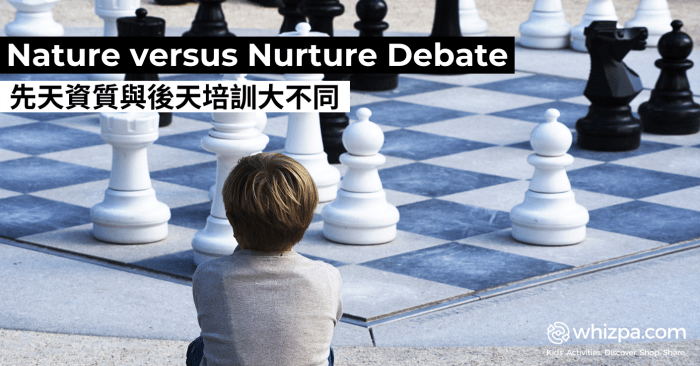
先天資質與後天培訓大不同
The nature versus nurture debate has been an age-old one in the field of psychology.
Some people believe that nature of our genes (nature) dictates our personality, while others believe it’s the environment, social connections, relationships (nurture) that determine one’s individuality.
Increasingly, people are beginning to realise that wondering as to how much heredity or environment influence a particular trait is not quite the right approach. Over the last decade or so, most experts have started to recognise that both nature and nurture play crucial roles. A combination of genes and environment is important for a person’s success. Moreover, there is no simple way to disentangle the multitude of forces that exist.
Kevin Davies, the author of Cracking the Genome, demonstrated how nature and nurture interact with the help of an example that pertains to the world of music. Some individuals are able to identify the perfect pitch. Perfect pitch is the ability to detect the pitch of a musical tone without any reference note. This ability is considered remarkably rare. Researchers discovered that this ability is usually tied to a single gene and if one person in the family possesses that gene, there is a high chance that their successors would have it too. However, they also found out that having the gene alone does not mean the person will invariably develop this ability. It is necessary to have the right musical training during early childhood to allow this inherited skill to come to the surface and flourish.
Another example that explains how nature and nurture go together is the height of an individual. Now a child may be born into a family where everyone is tall and he or she may have inherited those ‘tall height genes’. However, if the child does not get the right nourishment or is deprived of a wholesome environment, he or she may never attain the kind of height other family members have.
What does this all mean for parents, teachers and caregivers? Should we stop trying too hard to upskill our kids or shall we continue to push them until they succeed?
Well, this theory helps us understand that no matter where our kids are in their academic or skill-based cycle, there are definitely ways we can train them to be better. But we have to do it in a gentle and nurturing manner. Here are a few ways we can do so:
Take Care of the Basics - It goes without saying but as parents, we need to make sure our child gets enough sleep, eats balanced and nutritious means, maintains good hygiene, has sound emotional health, and receives regular medical care. The ministry of education in British Columbia suggests that kids who eat a healthy breakfast outperform those that don’t on several factors such as academic performance, concentration, and cognitive ability.
Be Their Support System – We need to let our kids know that it is okay to fail and learn from mistakes. We should use lots of encouragement and not give up on them. We’ve all heard the adage - “Be your child’s biggest cheerleader”. There is great value in this statement. Make sure your kids believe in themselves and have the confidence that they are valued by their family, no matter what their report card says. Reiterate this message to build up their self-esteem over and over again.
Enlist Help of a Specialist - If you are unsure of what kind of interventions you need to provide to your child to train him/her to better themselves at a particular subject, it’s best to involve a specialist and seek the way forward.
Offer an Enriching Environment - In 2010, psychologist George W. Holden theorized that a parent’s day-to-day decisions and nurturing ability can determine a child’s growth and future success. Your child’s genes may give them the intelligence needed to be, let’s say, an engineer, but how you interact with them as a parent (are you an authoritarian versus permissive parent) could determine their progress.
Make your Kids Believe That Intelligence Can be Improved - The following example may surprise you if you thought intelligence is fixed. In a 2007 study conducted at Columbia and Stanford (Blackwell, Trzesniewski, and Dweck), researchers assessed the Maths ability of 7th-grade students. For the first group of students, researchers applied an incremental theory intervention. Students in this intervention group were made to believe that the brain is like a muscle and it can be strengthened through effort and subsequently, intelligence can be nurtured and enhanced. Students in the second group while received additional enriching activities such as targeted instruction were not educated about the malleability of their intelligence. By the end of the intervention, the second group’s Maths grades had declined while the decline was reversed in the incremental theory intervention group. The students’ belief that they could grow and enhance their intelligence and it is not some fixed characteristic we are born within fact achieved this result.
Fine Tune Your Child’s Motivation - We need to empower our kids just so they make their life choices not out of fear or competition, but because they see value in doing their best. A student will always be under pressure if he/she is studying hard to please a parent or a teacher or outshine a peer. A student will be able to study to the best of her ability if she thinks this subject or skill will help her learn or grow as a person or contribute meaningfully to others around her.
Children should be taught that intelligence is malleable and effort can activate intelligence. Then if your kids find something difficult, they will be able to look at it as a challenge/ a roadblock in their path to success. They won’t look at it as a threat that is bound to derail them. A lot of factors are involved in academic achievement, some of which are undoubtedly genetic. Yet, it is important to note that so much for our well-being depends on our own psychology. We don’t have to try to make our kids into academic prodigies but if we just keep encouraging them by reconstructing difficulty as a challenge, that will help grow their intelligence and most of our kids can advance manifold with ease.
So, in conclusion, there will always be disagreement among scientists about whether nature or nurture is more influential. But enough research suggests that in reality, it’s both. As a parent, you have little influence on nature, but it’d be wise to continue to nurture our children to the best of our abilities and enable them to flourish in their chosen fields.
Do let us know what you think about this debate.








